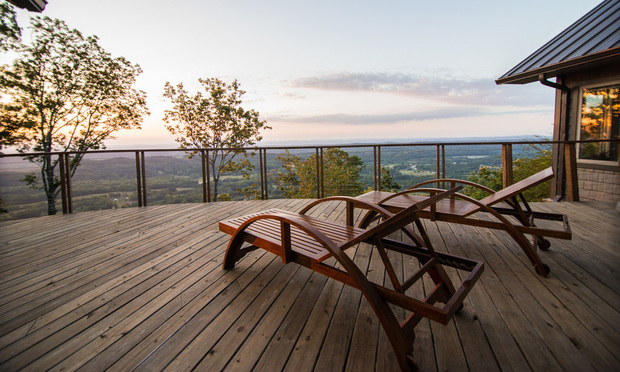 (Courtesy photo)
(Courtesy photo)
When Chattanooga resident Samuel Silvey began renting a Lookout Mountain vacation home he owned on Airbnb, city officials told him they would prosecute him if he didn’t stop.
On Feb. 1, Silvey sued the city and Mayor David Bennett, seeking a court order barring them from enforcing a ban imposed last October that prohibits short-term rentals of homes in areas zoned for single-family dwellings.
That ordinance amended an earlier one approved by the city in 2016 that, according to Silvey’s lawsuit, did not include an occupancy restriction for single-family homes. Silvey’s property covenants also did not restrict whether or how long the house could be rented.
The house, with its quaint address of 1609½ Fairy Dell Trail, is near the Georgia-Tennessee line in the heart of the North Georgia mountains.
 Wilson DuBose
Wilson DuBose
Silvey bought the house in 2012. In 2014, he began renting it out on Airbnb, said his attorney, Wilson DuBose.
Lookout Mountain began contemplating a new ordinance to restrict short-term vacation rentals in 2016 after neighbors began complaining, including two residents of Fairy Dell Trail, according to the Lookout Mountain Mirror.
At one city planning session last year before a revised version of the 2016 ordinance passed, one citizen warned that short-term rentals could lead to “possibly pedophiles walking around our streets, next to our children,” according to a report in the Chattanooga Times-Free Press.
William Pickering of Chattanooga’s Chambliss, Bahner & Stophel and Lookout Mountain’s city attorney, referred questions about the suit to Ron Womack, a partner at Womack Gottlieb & Rodham in LaFayette, Georgia. Womack said late Thursday that he has been notified of the suit. The city, he said, “is taking the position that the suit is without any merit. And I believe it is continuing to take a position that those vacation rentals are not and never have been permitted as uses in the city’s residential single-family zones.”
The question of whether Silvey may continue to lease the Lookout Mountain house through Airbnb, VBRO (Vacation Rental by Owner) or another online rental website reflects a growing national trend as municipalities begin cracking down on the practice, DuBose said.
In 2016, Airbnb sued the California cities of Anaheim, San Francisco and Santa Monica, challenging recently passed zoning ordinances that barred short-term leasing or imposed burdensome requirements on the homeowners.
Last year, the city of Charleston sued an Illinois investment company that owned and leased a historic Charleston home online, alleging the short-term leases violated the city’s rental zoning ordinance.
In Michigan, state legislators introduced bills that would bar local governments from enacting zoning ordinances banning or otherwise restrict owners who rented homes or apartments for less than 28 days.
And in Chattanooga, the city council last June voted to restrict short-term rentals.
DuBose said Silvey’s case is the third he has litigated over a short-term vacation rental. Two of those cases have involved vacation rentals on Lake Oconee east of Atlanta, one of which led to the arrest and jailing of the New Jersey owner. In the second case, the homeowner decided to pay a fine rather than challenge the ordinance.
“We believe that jurisdictions passing these new ordinances are not giving proper consideration to grandfathered rights for people who rented on a short-term basis prior to the adoption of these new ordinances,” DuBose said.
Silvey’s complaint says city officials began contacting him in 2016 to complain that his short-term rentals violated Lookout Mountain’s zoning ordinance. Last December, the mayor sent Silvey a letter threatening him with prosecution if he continued to rent the Fairy Dell Trail dwelling short-term.
Wilson said he has asked for an injunction that would bar the city from citing or prosecuting Silvey. The suit also asks that Silvey be allowed to continue to lease the property short-term. It also claims the zoning ordinance in effect when Silvey first posted the house for lease on Airbnb did not prohibit short-term vacation rentals.
DuBose said that, absent a ruling, Silvey could face daily fines and possible jail time if he fails to comply with the new zoning law.
“We asked the city if they would consider holding enforcement in abeyance until we could get some kind of judicial determination,” DuBose said. “They would not agree to do that.”
At one point, DuBose said city officials told him that, if Silvey continued to lease the house, city workers “would be observing the house,” and, if they spotted cars in the driveway, they intended to knock on the door and question the occupants.
DuBose said concern Silvey might be jailed on a misdemeanor are not unfounded. That’s what happened to DuBose’s client, Christine May, after she rented her house on Lake Oconee.
Christine May appeared in court, expecting to face a fine, at the worst, for violating the ordinance. Instead, Morgan County Superior Court Judge Alison Burleson sentenced May to 30 days in jail and ordered her taken into custody, DuBose recalled. It took more than two days to secure a bond and obtain May’s release, he said.
May soon filed a state challenge to her criminal prosecution and a federal challenge to Morgan County’s short-term rental ordinance. Both challenges remain in litigation, DuBose said.


